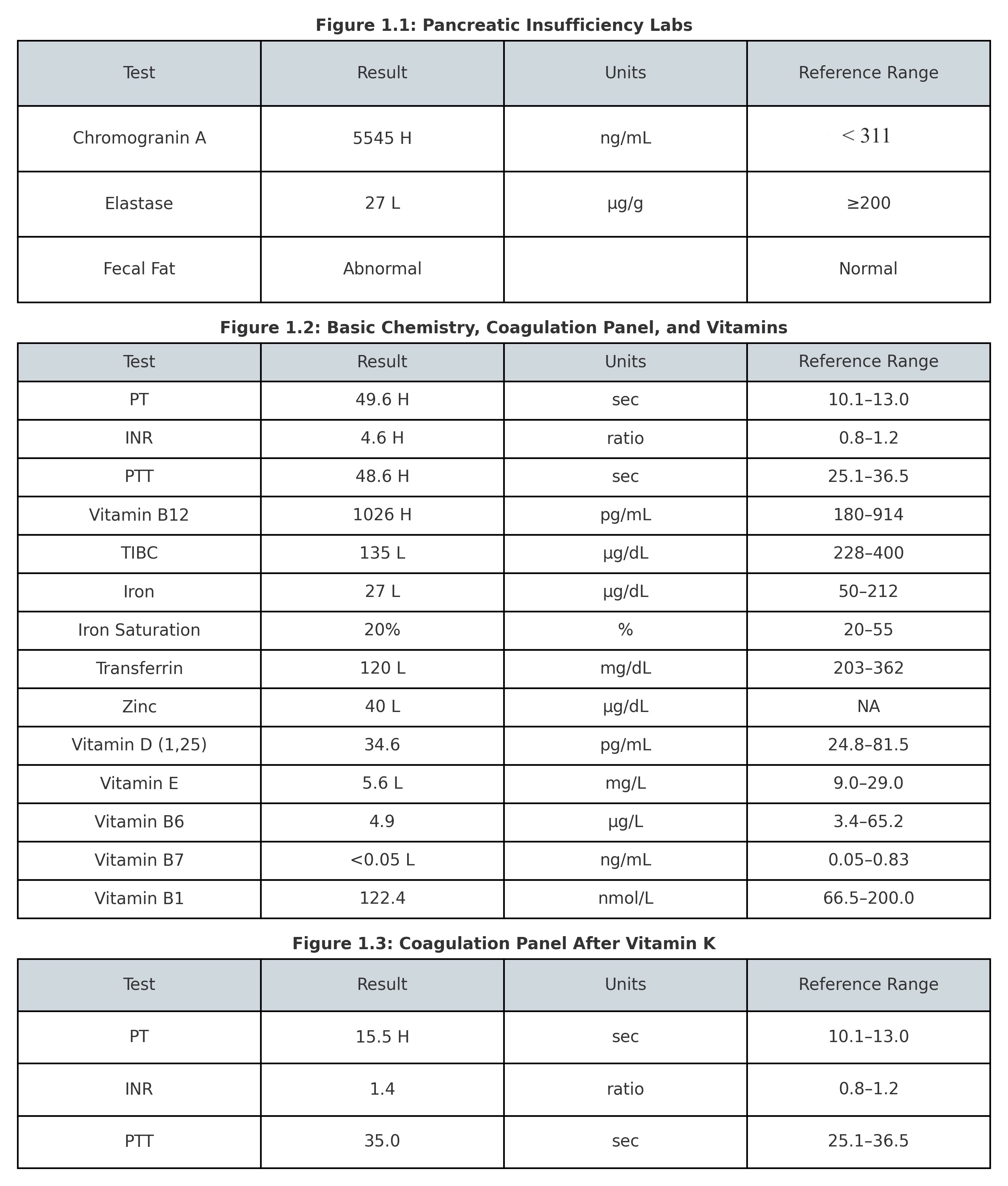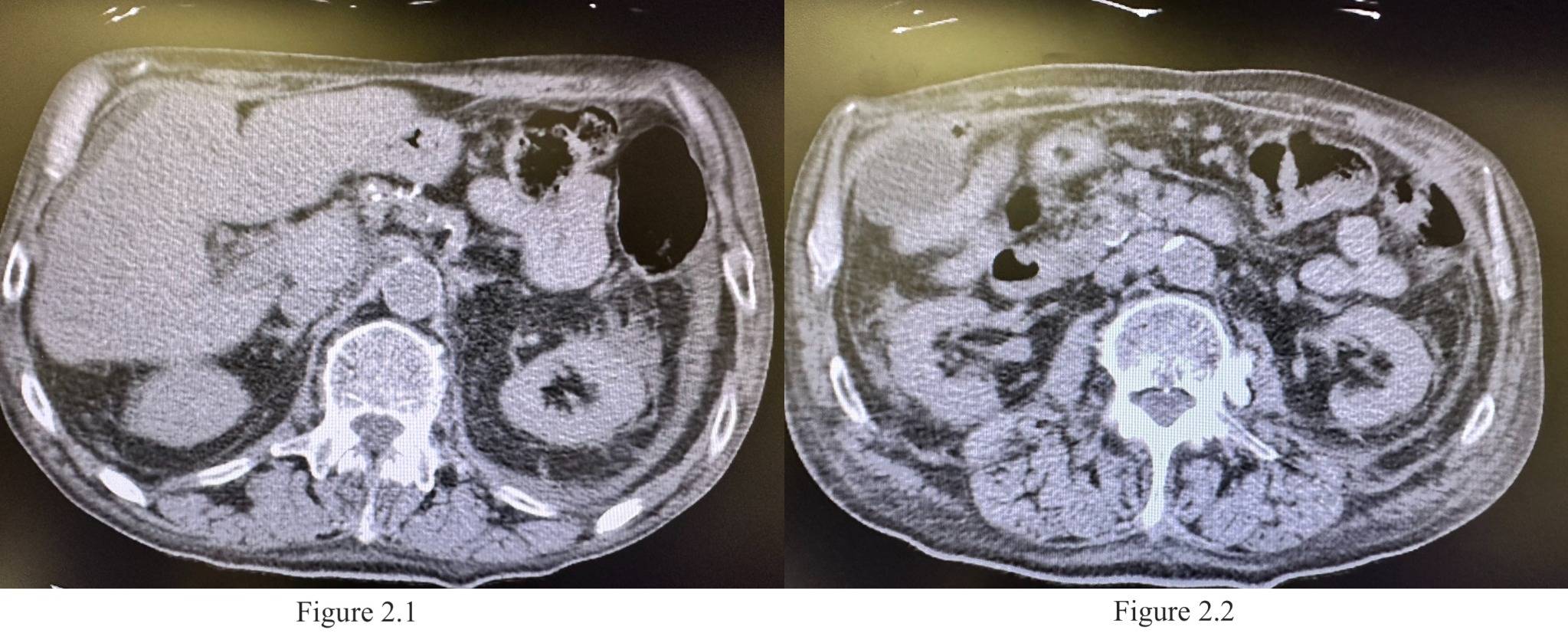Monday Poster Session
Category: Biliary/Pancreas
P2343 - Hormonal Therapy for Carcinoid Syndrome: A Potential Trigger for Exocrine Pancreatic Insufficiency
Monday, October 27, 2025
10:30 AM - 4:00 PM PDT
Location: Exhibit Hall
- LC
Lixamar Colon Vicenti, MD, MSNS (she/her/hers)
University of Texas Health Science Center
San Antonio, TX
Presenting Author(s)
Lixamar Colon Vicenti, MD, MSNS1, Hannah Yoo, MD2, Krystal Cruz Escobar, DO2
1University of Texas Health Science Center, San Antonio, TX; 2University of Texas Health San Antonio, San Antonio, TX
Introduction: Carcinoid syndrome, the most common ectopic hormonal syndrome associated with neuroendocrine tumors (NETs), results from unfiltered systemic release of vasoactive amines like serotonin due to hepatic metastases. Hallmark symptoms include flushing, diarrhea, and wheezing. Somatostatin analogs (SSAs) such as lanreotide are first-line therapy.
Case Description/
Methods: We present a man in his 60s with alcohol use disorder, prostate cancer on androgen deprivation, and metastatic small bowel NET on long-term lanreotide. He presented with anasarca, orthostatic presyncope, muscle wasting, and chronic diarrhea (2–3 episodes/day for over 4 years despite antidiarrheals). Tumor burden appeared stable, but chromogranin A was markedly elevated, raising concern for persistent carcinoid activity contributing to malabsorption.
Labs revealed fat-soluble vitamin deficiencies (A, D, E, K), INR >10 (corrected with vitamin K), and fecal elastase < 10 µg/g, confirming exocrine pancreatic insufficiency (EPI). Imaging showed pancreatic atrophy and calcifications suggestive of chronic pancreatitis (Figures 1.1–1.3, 2.1–2.2). This raised the question of chronic SSA exposure versus long-standing alcohol use disorder as contributing etiologies. CREON, a pancreatic enzyme replacement therapy (PERT), was initiated, leading to improved diarrhea, nutritional repletion, and successful diuresis.
Discussion: Although EPI is rarely reported in SSA trials for gastroenteropancreatic neuroendocrine neoplasms (GEP-NENs), its prevalence in clinical practice is significantly higher—up to 20% in some series. Despite this, EPI remains under-recognized, as demonstrated here where it was not considered even after 14 years of disease. Among patients with well-differentiated NETs treated with SSAs, EPI occurs in approximately 1 in 4 cases. Screening with fecal elastase-1 (FE1) in symptomatic patients should be part of a guideline-based approach, as up to 92% of affected patients benefit from PERT. Routine screening for malnutrition should be implemented in all GEP-NEN patients. Treatment of diarrhea should be guided by its etiology. Early involvement of gastroenterology, oncology, and endocrinology is recommended to co-manage chronic diarrhea, a frequent yet multifactorial symptom.
Portions of this case report were edited with the assistance of AI-based language tools

Figure: FIGURE 1.1–1.3
1.1: Pancreatic insufficiency and carcinoid monitoring labs showing elevated chromogranin A (no prior baseline in EMR), suggestive of possible active carcinoid syndrome. Fecal fat was abnormal, and fecal elastase was markedly reduced, consistent with newly diagnosed exocrine pancreatic insufficiency.
1.2: Basic chemistry, coagulation panel, and micronutrient assessment on admission revealed coagulopathy (elevated INR), iron deficiency anemia, and deficiencies in zinc and vitamin E. Vitamin D was within the low-normal range.
1.3: Post-treatment coagulation panel demonstrating INR normalization following intramuscular and oral vitamin K, consistent with coagulopathy secondary to vitamin K deficiency from malabsorption.

Figure: CT Abdomen and Pelvis without contrast (11/2024) demonstrating mesenteric, periportal, and retroperitoneal lymphadenopathy, consistent with findings on recent MRI. Hepatic metastases were suboptimally evaluated due to lack of IV contrast. A small-to-moderate left pleural effusion was also noted. While not formally described in the radiology report, imaging review revealed pancreatic atrophy and calcifications suggestive of chronic pancreatitis.
Disclosures:
Lixamar Colon Vicenti indicated no relevant financial relationships.
Hannah Yoo indicated no relevant financial relationships.
Krystal Cruz Escobar indicated no relevant financial relationships.
Lixamar Colon Vicenti, MD, MSNS1, Hannah Yoo, MD2, Krystal Cruz Escobar, DO2. P2343 - Hormonal Therapy for Carcinoid Syndrome: A Potential Trigger for Exocrine Pancreatic Insufficiency, ACG 2025 Annual Scientific Meeting Abstracts. Phoenix, AZ: American College of Gastroenterology.
1University of Texas Health Science Center, San Antonio, TX; 2University of Texas Health San Antonio, San Antonio, TX
Introduction: Carcinoid syndrome, the most common ectopic hormonal syndrome associated with neuroendocrine tumors (NETs), results from unfiltered systemic release of vasoactive amines like serotonin due to hepatic metastases. Hallmark symptoms include flushing, diarrhea, and wheezing. Somatostatin analogs (SSAs) such as lanreotide are first-line therapy.
Case Description/
Methods: We present a man in his 60s with alcohol use disorder, prostate cancer on androgen deprivation, and metastatic small bowel NET on long-term lanreotide. He presented with anasarca, orthostatic presyncope, muscle wasting, and chronic diarrhea (2–3 episodes/day for over 4 years despite antidiarrheals). Tumor burden appeared stable, but chromogranin A was markedly elevated, raising concern for persistent carcinoid activity contributing to malabsorption.
Labs revealed fat-soluble vitamin deficiencies (A, D, E, K), INR >10 (corrected with vitamin K), and fecal elastase < 10 µg/g, confirming exocrine pancreatic insufficiency (EPI). Imaging showed pancreatic atrophy and calcifications suggestive of chronic pancreatitis (Figures 1.1–1.3, 2.1–2.2). This raised the question of chronic SSA exposure versus long-standing alcohol use disorder as contributing etiologies. CREON, a pancreatic enzyme replacement therapy (PERT), was initiated, leading to improved diarrhea, nutritional repletion, and successful diuresis.
Discussion: Although EPI is rarely reported in SSA trials for gastroenteropancreatic neuroendocrine neoplasms (GEP-NENs), its prevalence in clinical practice is significantly higher—up to 20% in some series. Despite this, EPI remains under-recognized, as demonstrated here where it was not considered even after 14 years of disease. Among patients with well-differentiated NETs treated with SSAs, EPI occurs in approximately 1 in 4 cases. Screening with fecal elastase-1 (FE1) in symptomatic patients should be part of a guideline-based approach, as up to 92% of affected patients benefit from PERT. Routine screening for malnutrition should be implemented in all GEP-NEN patients. Treatment of diarrhea should be guided by its etiology. Early involvement of gastroenterology, oncology, and endocrinology is recommended to co-manage chronic diarrhea, a frequent yet multifactorial symptom.
Portions of this case report were edited with the assistance of AI-based language tools

Figure: FIGURE 1.1–1.3
1.1: Pancreatic insufficiency and carcinoid monitoring labs showing elevated chromogranin A (no prior baseline in EMR), suggestive of possible active carcinoid syndrome. Fecal fat was abnormal, and fecal elastase was markedly reduced, consistent with newly diagnosed exocrine pancreatic insufficiency.
1.2: Basic chemistry, coagulation panel, and micronutrient assessment on admission revealed coagulopathy (elevated INR), iron deficiency anemia, and deficiencies in zinc and vitamin E. Vitamin D was within the low-normal range.
1.3: Post-treatment coagulation panel demonstrating INR normalization following intramuscular and oral vitamin K, consistent with coagulopathy secondary to vitamin K deficiency from malabsorption.

Figure: CT Abdomen and Pelvis without contrast (11/2024) demonstrating mesenteric, periportal, and retroperitoneal lymphadenopathy, consistent with findings on recent MRI. Hepatic metastases were suboptimally evaluated due to lack of IV contrast. A small-to-moderate left pleural effusion was also noted. While not formally described in the radiology report, imaging review revealed pancreatic atrophy and calcifications suggestive of chronic pancreatitis.
Disclosures:
Lixamar Colon Vicenti indicated no relevant financial relationships.
Hannah Yoo indicated no relevant financial relationships.
Krystal Cruz Escobar indicated no relevant financial relationships.
Lixamar Colon Vicenti, MD, MSNS1, Hannah Yoo, MD2, Krystal Cruz Escobar, DO2. P2343 - Hormonal Therapy for Carcinoid Syndrome: A Potential Trigger for Exocrine Pancreatic Insufficiency, ACG 2025 Annual Scientific Meeting Abstracts. Phoenix, AZ: American College of Gastroenterology.

